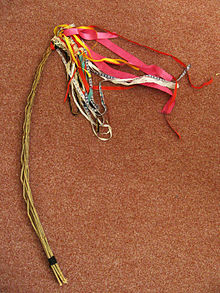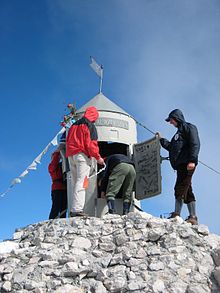Spanking is a common form of corporal punishment, involving the act of striking the buttocks of another person to cause physical pain, generally with an open hand. More severe forms of spanking, such as switching, paddling, belting, caning, whipping, and birching, involve the use of an object instead of a hand.
Parents commonly spank children or adolescents in response to undesired behavior. Boys are more frequently spanked than girls, both at home and in school. Some countries have outlawed the spanking of children in every setting, including homes, schools, and penal institutions, but most allow it when done by a parent or guardian.
Terminology
In North America, the word "spanking" has often been used as a synonym for an official paddling in school, and sometimes even as a euphemism for the formal corporal punishment of adults in an institution.
In British English, most dictionaries define "spanking" as being given only with the open hand. Flagellation was so common in England as punishment that spanking (and caning and whipping) are called "the English vice".
In American English, dictionaries define spanking as being administered with either the open hand or an implement such as a paddle. Thus, the standard form of corporal punishment in US schools (use of a paddle) is often referred to as a spanking.
In the United Kingdom,
Ireland, Australia and New Zealand, the word "smacking" is generally
used in preference to "spanking" when describing striking with an open
hand, rather than with an implement. Whereas a spanking is invariably
administered to the bottom, a "smacking" is less specific and may refer
to slapping the child's hands, arms or legs as well as its bottom.
In the home
Painting by Georg Conrad (1827–1889)
Parents commonly spank their children as a form of corporal punishment in the United States; however, support for this practice appears to be declining amongst U.S. parents. Spanking is typically done with one or more slaps on the child's buttocks with a bare hand, although, not uncommonly, various objects are used to spank children. Historically, boys have been spanked more than girls. In the United States, the spanking of infants is common, with toddler-age children being spanked the most. The main reasons parents give for spanking children are to make children more compliant and to promote better behavior, especially to put a stop to children's aggressive behaviors.
However, research has shown that spanking (or any other form of corporal punishment) is associated with the opposite effect.
Children who are physically punished tend to obey parents less with
time, and to develop more aggressive behaviors, including toward other
children. This increase in aggressive behavior is thought to reflect the child's perception that hitting is the way to deal with anger and frustration.
There are also a number of adverse physical, mental, and emotional
effects correlated with spanking and other forms of corporal punishment,
including various physical injuries, increased anxiety, depression, and antisocial behavior. Adults who were spanked during their childhood are more likely to abuse their own children and spouse.
The American Academy of Pediatrics (AAP), Royal College of Paediatrics and Child Health (RCPCH), and the Royal Australasian College of Physicians (RACP) all recommend that no child should be spanked and instead favor the use of effective, healthy forms of discipline. Additionally, the AAP recommends that primary care providers (e.g., pediatricians and family medicine physicians)
begin to discuss parents' discipline methods no later than 9 months of
age and consider initiating such discussions by age 3–4 months. By 8 months of age, 5% of parents report spanking and 5% report starting to spank by age 3 months.
The AAP also recommends that pediatricians discuss effective discipline
strategies and counsel parents about the ineffectiveness of spanking
and the risks of harmful effects associated with the practice in order
to minimize harm to children and guide parents.
Although parents and other advocates of spanking often claim that spanking is necessary to promote child discipline,
studies have shown that parents tend to apply physical punishment
inconsistently and tend to spank more often when they are angry or under
stress. The use of corporal punishment by parents increases the likelihood that children will suffer physical abuse, and most documented cases of physical abuse in Canada and the United States begin as disciplinary spankings.
If a child is frequently spanked, this form of corporal punishment
tends to become less effective at modifying behavior over time (also
known as extinction).
In response to decreased effectiveness of spanking, some parents
increase the frequency or severity of spanking or use an object.
Parents may spank less (or not at all) if they have learned
effective discipline techniques since many parents view spanking as a
method of last resort to discipline their children.
There are many effective alternatives to spanking and other forms of
corporal punishment. For example, such techniques include time-ins
(increasing attention, praise, and special time to promote desired
behaviors), time outs (taking a break from escalating misbehavior), positive reinforcement (rewarding desirable behavior (e.g., with a star, sticker, or treat)), non-physical negative reinforcement
(an unpleasant consequence follows misbehavior (e.g., replying with a
sharp "no" to express disapproval for a specific action or by taking
away a privilege)), passive inattention (ignoring low-level misbehaviors
and prioritizing attention for more significant forms of misbehavior
appropriate for a child's developmental level), and avoidance (avoid the
opportunity for the misbehavior to occur and thus the need for
corrective discipline).
In schools
Corporal punishment, usually delivered with an implement (such as a paddle or cane)
rather than with the open hand, used to be a common form of school
discipline in many countries, but it is now banned in most of the
Western World.
Corporal punishment, such as caning, remains a common form of
discipline in schools in several Asian and African countries, even in
countries in which this practice has been deemed illegal such as India and South Africa. In these cultures it is referred to as "caning" and not "spanking."
The Supreme Court of the United States in 1977 held that the paddling of school students was not per se unlawful.
However, 31 states have now banned paddling in public schools. It is
still common in some schools in the South, and more than 167,000
students were paddled in the 2011-2012 school year in American public
schools. Students can be physically punished from kindergarten to the end of high school, meaning that even adults who have reached the age of majority are sometimes spanked by school officials.
A number of medical, pediatric or psychological societies have
issued statements opposing all forms of corporal punishment in schools,
citing such outcomes as poorer academic achievements, increases in
antisocial behaviors, injuries to students, and an unwelcoming learning
environment. They include the American Medical Association, the American Academy of Child and Adolescent Psychiatry, the American Psychoanalytic Association, the American Academy of Pediatrics (AAP), the Society for Adolescent Medicine, the American Psychological Association, the Royal College of Paediatrics and Child Health, the Royal College of Psychiatrists, the Canadian Paediatric Society and the Australian Psychological Society, as well as the United States' National Association of School Psychologists and National Association of Secondary School Principals.
Adult spanking
Theatrical release poster for Kiss Me Kate, 1953.
Men spanking their wives and girlfriends was often seen as an
acceptable form of domestic discipline in the early 20th century as a
way to correct behavior, maintain male dominance, and enforce gender
norms. It was a common trope in American films. In the early 21st century, adherents of a small subculture known as Christian domestic discipline rely on a literalist interpretation of the Bible to justify spanking as a form of punishment of women by their husbands. Critics describe such practices as a form of domestic abuse. Some consider it a simple sexual fetish and an outlet for sadomasochistic desires. Christian conservative radio host Bryan Fischer said to the Huffington Post that it was a "horrifying trend – bizarre, twisted, unbiblical and un-Christian".
Ritual spanking traditions
An Easter whip (Czech: pomlázka; Slovak: korbáč)
Spanking of people who have for the first time succeeded in climbing on the top of Mount Triglav (2,864 metres or 9,396 feet), the highest mountain of Slovenia
There are some rituals or traditions which involve spanking. For
example, on the first day of the lunar Chinese new year holidays, a
week-long 'Spring Festival', the most important festival for Chinese
people all over the world, thousands of Chinese visit the Taoist Dong Lung Gong
temple in Tungkang to go through the century-old ritual to get rid of
bad luck. Men traditionally receive spankings and women get whipped,
with the number of strokes to be administered (always lightly) by the
temple staff being decided in either case by the god Wang Ye and by
burning incense and tossing two pieces of wood, after which all go home
happily, believing their luck will improve.
On Easter Monday, there is a Slavic tradition of spanking girls and young ladies with woven willow switches (Czech: pomlázka; Slovak: korbáč) and dousing them with water.
In Slovenia, there is a jocular tradition that anyone who succeeds in climbing to the top of Mount Triglav receives a spanking or birching




